- Home
- Alex Archer
The Mortality Principle Page 2
The Mortality Principle Read online
Page 2
The radio still provided its thin layer of background noise, but against the sounds of the waking hotel it was little more than a sibilant hiss. Her dreams had been filled with violence and fear. She knew logically there was nothing she could have done about the fighting in the street—it had been over before she was even aware of it—but that didn’t stop her subconscious mind from tormenting her with a guilt-tripped sleep.
She had no appetite for breakfast.
Annja showered, standing in the steaming hot spray long enough to turn her body a dark shade of pink, then wrapped a towel around herself and made a particularly foul cup of coffee from the selection of instant blends on offer. The heat alone was enough to make her feel more alive.
It was barely seven-thirty. If anything was going to revive her, it was the crisp morning air, which would only be clean and crisp for maybe another thirty minutes or so before the city filled with traffic.
Five minutes later she was stretching on the pavement, her hair pulled back in a still-damp ponytail.
She started to run, moving lightly on her feet, weaving a path through the narrow alleyways around the hotel, up beyond the corner that would have taken her over the Charles Bridge toward the palace on the hill, toward Wenceslas Square. Her muscles were tight, but as the blood started to flow they loosened up. Her breathing came in little wispy puffs of steam that corkscrewed up in front of her face.
In the distance Annja heard the sound of a siren approaching.
Without realizing it she was running toward the source of the previous night’s fight. Within the few minutes she’d been out, the streets had already begun to show increasing signs of life with café owners setting up the tables outside their windows. A newspaper vendor on the street corner beside the subway entrance was doing a brisk trade as people passed by in a rush to get to work. It was the kind of thing she saw in every street in every city. Every time she skirted that hubbub of life it reminded her how lucky she was not to be caught up in it. She couldn’t imagine drifting through life. Annja harbored no illusions just how lucky she was to live the life she did. That was just another reason why this live-broadcast Twitter-chasing plan made her so uncomfortable. She had secrets, just like everyone else. The idea of turning the world into citizen archaeologists and sending them out to chase monsters had the power to turn her life upside down.
She slowed as she reached the far end of the street. People had begun to gather, blocking the way.
One man stepped away from the group.
He pulled out his cell phone.
She was too far away to hear what the man said as he spoke into his phone, but his body language spoke volumes. He was calling the police.
At the sound of the approaching siren a few people peeled away from the crowd. They disappeared into the side streets and wider spaces beyond, happy not to be involved once the police arrived.
Annja stepped into a gap that had been created as a middle-aged woman stepped away. The woman’s rigid expression gave plenty warning of what she was about to see. A shiver raced up Annja’s spine as she peered through the cluster of bodies: a man in a blue suit crouched over someone lying on the ground in an alleyway that ran between two buildings. Annja saw the dark, damp patch staining the cobbles at his feet as she worked her way closer. The man was fighting for a life that wasn’t there to be saved. He stood and shook his head to no one in particular. There was nothing he could do. Nothing anyone could do. As he moved away to the fresher air of the street, Annja saw the body properly.
The victim had been dead for some time.
Four and a half hours, Annja thought, looking at the ragged clothes the body wore, and at the stains that had turned them the same dark color as the ground around the corpse.
Judging by the state of his clothes, there was every chance this usually quiet alleyway was where the dead man made his bed for the night. Could his death be the consequence of a fight over something as tragic as the meager shelter that the alleyway offered? If it was, then it was a poor way to end a life that had surely seen more than its fair share of troubles. Annja rubbed a hand through her damp hair. The body that lay in the narrow space was no longer a man; now it was evidence to be picked over in the mortuary.
It didn’t need a pathologist to read the crime scene. This wasn’t death by natural causes. There was nothing accidental about it. She’d been right the previous night; there had been violence in the air. She couldn’t have stopped it. She couldn’t even let herself think that way. The world wasn’t her responsibility. She couldn’t police every street and save every victim.
When the police car came to a halt only a few feet away from the crowd, the press of bodies miraculously thinned, gawkers suddenly remembering they had somewhere else to be. The man in the suit spoke to a policeman, no doubt explaining that he had found the dead man. Annja couldn’t understand the few words she caught. One policeman made a note in his small black book, presumably of the man’s name and address while the other worked his way through the remaining gawkers to the corpse. A few seconds later, after the briefest of glances at the dead vagrant, he began to usher everyone back.
The forlorn siren song of an approaching ambulance was wholly out of place and much too late, unless it was bringing a priest. By the look of the dead man, every last ounce of hope had been torn from him, shredded, before he had finally slumped to the ground and spilled what little was left of his bodily fluids out across the cobbles.
Annja was still wrapped up in her thoughts when she realized that the policeman was talking to her. She shook her head.
“Sorry,” she said. “I don’t speak Czech.”
“Ah, did you see anything?” he asked, switching to English easily, though his voice carried a heavy accent. There was no way anyone would mistake him for a native speaker. Annja shook her head, so he moved on to the next person, no doubt sure this was a crime that didn’t warrant investigating given who the victim was.
“I might have heard something, though,” Annja said to his back. “Last night.”
He made no effort to disguise his world-weary sigh as he turned back to her. His pen was still poised over his pad. “What did you hear?”
Annja chose her words carefully. She didn’t want to risk any misunderstanding. “I heard a fight,” she began.
“A fight?”
She nodded. “Two men,” she said, though even as the words left her lips she couldn’t actually be sure that it was the truth. She’d heard so little, even with the window open. In truth, she had no reason to believe the dead man had anything to do with the struggle she had heard in the night.
“Can you describe them?” the policeman asked. “Anything at all?”
Annja held out her hands, shaking her head slightly. “I’m sorry, no. I only heard them. I can’t even be sure what I heard. It just sounded like fighting, but it was over very quickly, then I heard footsteps running away. It could have been anything, really. I just thought you should know.”
“When was this?”
“A little before three.”
“And where were you when you heard this altercation?”
She pointed in the direction of her hotel room, and her window, which didn’t really overlook the street by more than a few degrees, the laws of physics explaining why she hadn’t been able to see anything. The expression on his face changed. She couldn’t read him. He looked tired, and the stubble on his chin suggested a long night on duty was about to turn into an even longer day on duty. He made a note of her name and the room number, and offered cursory thanks as he moved on to the next face in the crowd, repeating his questions.
A man tried to enter the alleyway, but the policeman stopped him. The newcomer wouldn’t be deterred. He was determined to cut through the narrow passageway, and no dead body was going to stop him. The officer prodded him in the chest with a stubby finger. He might as well have hit the man with a Taser gun; the effect was just about the same. Annja turned toward the hotel and walked away as the disgrun
tled man started threatening to have the policeman’s badge. At least, that was what she chose to imagine his rant entailed. He could have been asking for alternative directions or if the good officer fancied a nice game of global thermonuclear war, for all she knew.
2
Annja still had no appetite.
She made her way into the dining room for breakfast, though she wasn’t sure she could face much more than a cup of strong black coffee. The stronger, the better, given it was going to have to mask the taste of death that had been cloying at the back of her throat since she stood in the alleyway.
“Can I get you anything else?” the waitress asked as she topped up her cup with a third refill in half an hour.
“I’m good, thanks,” Annja replied, picking up the cup without even thinking about it. She was no stranger to death, which wasn’t something she would have ever thought she’d find herself thinking a few years ago, but things had changed since Roux and Garin had walked into her life. What should have been the most horrific thing imaginable had almost become a fact of life, and of course there were those harrowing times when it had been her doing, a matter of kill or be killed.
But this was different.
She couldn’t shift the guilt. She could have done something. She’d heard it happening, had known instinctively something was wrong, but hadn’t gone down to check it out. She’d simply lain there telling herself there was nothing she could do. And even now, knowing that she was right—at least academically—emotionally she couldn’t banish the self-loathing that came with not even trying.
Someone had torn that vagrant open.
“Is something wrong?” the waitress whispered, her voice so quiet that none of the other diners would be able to hear what she said.
“Nothing that another cup of coffee won’t put right if I know you,” a familiar voice said, the man joining her at the table.
Annja didn’t need to look up to know who her visitor was.
“Garin,” she said. “I’m not even going to ask how you found me.”
“Shall I get another cup?” the waitress asked, smiling at Garin.
“That would be great.” Garin Braden tilted his head and offered a killer smile. “And I think maybe eggs Benedict.”
“Of course.”
At times it almost felt like he was stalking her. Wherever she was, he had the unnerving ability to find her without calling first.
“I really need to change my cell phone number,” she said.
“Wouldn’t help, I’ve had you tagged.” Garin grinned, and she wasn’t entirely sure he was joking.
“What do you want?”
“Why so hostile?”
“I’m not, I’m just exhausted,” Annja said, which was partially true.
Garin nodded. “To be honest, I was just bored, and I hate being bored. I thought about taking a trip, but you know how it is. The thrill of white-water rafting and wing suits and bungee jumping and all that just pales into insignificance against everything else we do, so I thought, ‘I know, I’ll go see Annja. She’s normally up to her neck in something.’ And here I am. I took the liberty of checking into the room next to yours. No adjoining door, alas.”
“I don’t have time to amuse you, Garin. I’m working.”
“Actually, you’re having a cup of coffee.”
It had been a long time since Annja had worried about hurting his feelings; as far as she could tell he had no feelings to hurt. It didn’t stop him pulling a face as if she had mortally wounded him.
“I’d hate to have come all this way and not be able to at least share breakfast with my favorite television star.”
“Stop it, Garin. I’m not in the mood.”
“In the mood for what?”
“You.”
“Harsh, woman. Harsh.”
“The world doesn’t revolve around you. Hard to believe, I know, but someone’s got to tell you the truth.”
“And that, my dear, is why I love you most.”
“Shut up.”
Garin grinned.
“Anyway, I’m not sure I can sit around wasting more time today. I’ve already lost an hour this morning thanks to the police.”
“Oh, see, now I knew you’d be up to your neck in something interesting. The police? Do tell.” Garin leaned forward, elbows on the tabletop, all smiles and full of interest.
She knew that he was only sucking her in, a spider smiling at a vain fly, but she couldn’t help herself. It wasn’t that she was fooled by his easy charm; that only worked for so long. She needed to talk. If she didn’t, the guilt would only fester. She knew that. She knew herself. The sooner she gave voice to her thoughts, the sooner she would be able to leave it behind. It wouldn’t be the first time Garin had played Father Confessor to her. “There was a murder,” she said.
“Next time we sit down for breakfast I suggest you starting with that. ‘Hello, Garin, there was a murder.’ That’s so much more interesting than ‘What do you want?’ Did you see it?”
“No, but I am ninety-nine percent sure I heard it. I just didn’t realize that’s what it was at the time. I went out for a run this morning, and found people gathered around the body. I gave a statement to a policeman, but I’m pretty sure he was just humoring me by then. After all, it was just some homeless guy,” she said bitterly. “It’s not like the cops will lose sleep over it.”
“Oh, so cynical for one so young,” Garin said, with no hint of laughter even though his smile was still firmly in place, predatory now. “Sadly I think you’re right. The system doesn’t care about the poor bastards who slip between the cracks.”
“I care,” Annja said.
“I’m sure you do. So, what have you got?”
“Nothing, really. Time of death. That’s it. At 3:00 a.m.”
“I once heard that more people die at three in the morning than at any other time of day.”
“Not really very helpful.”
“No, but interesting. So, an argument over shelter? Or a bottle?”
She didn’t have time to answer him. The waitress returned and placed a cup in front of Garin, filling it with rich black coffee. Annja pushed the cream in his direction, but he waved it away. “Watching my figure,” he said.
The waitress laughed, no doubt another willing victim of Garin’s charms should he decide to stick around. And judging by his appreciative expression as he watched her retreat toward the kitchen, he’d decided to do just that.
“You know what else is interesting? I read about a dead vagrant in this morning’s newspaper.”
“Not a chance. There’s no way it was in the morning paper. They only found the body an hour ago.”
“I didn’t say your dead vagrant.”
“There have been others?”
“Oh, Annja,” Garin said patronizingly. “You really ought to take more of an interest in the here and now and pay a little less attention to what happened centuries ago. Dusty old books have nothing on television or the internet, you know. Not when it comes to living in the real world.”
“Don’t be a jerk. Just tell me what you know.”
“You take all the fun out of life, Annja Creed, but you know that, don’t you?”
“Share or shut up.”
Garin smiled, clearly enjoying the moment and determined to make the most of it.
That stupid grin was really beginning to grate on Annja’s nerves, but she wasn’t about to let him know that, so she smiled right back, sweetly.
“Okay,” he said at last, raising his hands in surrender. He’d had his fun. “There have been three deaths in as many weeks. Four now. One every week for a month. All of them have been street people. If the papers are right, the police are clueless. No one seems to know if this is a case of the city’s homeless fighting among themselves or if they’re looking for a lunatic who’s taken it upon himself to try to clean up the streets.”
“Clean up the streets? Surely no one in their right mind could think that they could kill every home
less person?”
“I did say lunatic, didn’t I?”
Annja shook her head. “There must be thousands of people living on the streets. It’s a capital city.”
“To clean up the streets you don’t need to kill all of them. You just have to make the ones left behind so afraid they gather up their few possessions and head out of town.”
“But they’ve got nowhere to go. They’re not on the streets for fun.”
Garin shrugged. “Right, but then they’re someone else’s problem.”
Annja knew he was right. “My enemy’s enemy is my friend, sort of thing,” Annja agreed. “And you think that’s what’s happening here?”
“I have no idea. Maybe. Hell, I’m sure Jack the Ripper thought that he was doing something positive about the number of prostitutes in London.”
Annja was doubtful. There were plenty of sick people in the world who would do something like this for kicks. She said as much. She wasn’t sure which was worse—someone killing out of some crazy idea that they were doing good or a calculating killer doing it for the simple pleasure of killing.
“Maybe the police are right,” Garin offered. “Maybe it really is just a case of the homeless fighting among themselves.”
His eggs arrived while she was thinking about the possibility.
One thing was sure—she didn’t feel any better about the fact that she hadn’t intervened, even if it had only been to call the police when she heard the scuffle. The time between the act and the discovery of the act only made it more difficult for justice to catch up with the killer.
She needed to get out of there.
Her head wasn’t in the right place. There was no way she was going to come up with something clever to say in front of the camera, at least not today. She made a call while Garin was eating and gave Lars, her cameraman, the day off. He wanted to know if she was okay. She assured him she was.
“So you’re going to have some free time, after all,” Garin said, wiping his lips as she ended the call. He’d made short work of polishing off his breakfast and was already signaling for a top-up to his coffee. He flashed the waitress that smile again, earning one right back.

 Rogue Angel: Forbidden City
Rogue Angel: Forbidden City The Spider Stone
The Spider Stone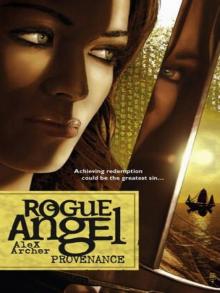 Provenance
Provenance Blood Cursed
Blood Cursed Fury's Goddess
Fury's Goddess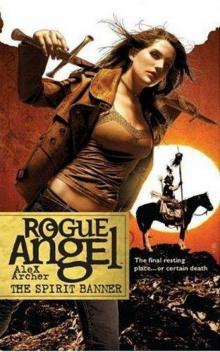 The Spirit Banner
The Spirit Banner Footprints
Footprints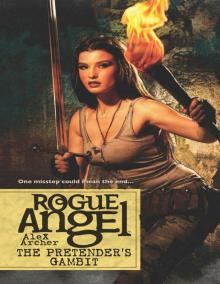 The Pretender's Gambit
The Pretender's Gambit Rogue Angel: The Lost Scrolls
Rogue Angel: The Lost Scrolls Staff of Judea
Staff of Judea Rogue Angel 55: Beneath Still Waters
Rogue Angel 55: Beneath Still Waters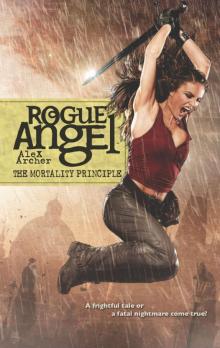 The Mortality Principle
The Mortality Principle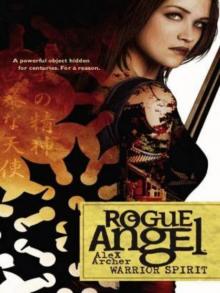 Warrior Spirit
Warrior Spirit Paradox
Paradox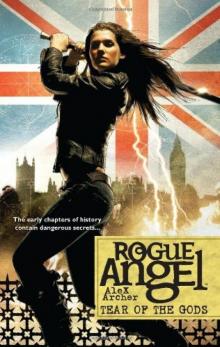 Tear of the Gods
Tear of the Gods Forbidden City
Forbidden City River of Nightmares (Rogue Angel)
River of Nightmares (Rogue Angel) Rogue Angel: The Secret of the Slaves
Rogue Angel: The Secret of the Slaves Destiny
Destiny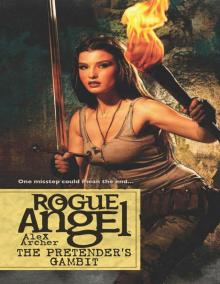 Rogue Angel 51: The Pretender's Gambit
Rogue Angel 51: The Pretender's Gambit Celtic Fire
Celtic Fire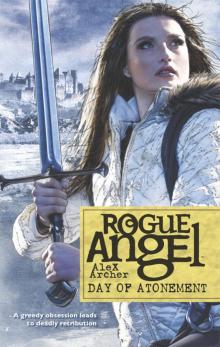 Rogue Angel 54: Day of Atonement
Rogue Angel 54: Day of Atonement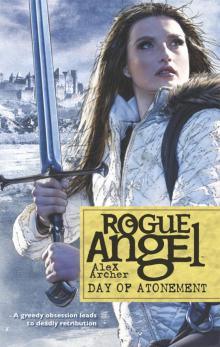 Day of Atonement
Day of Atonement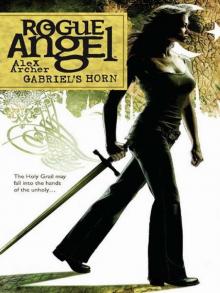 Rogue Angel: Gabriel's Horn
Rogue Angel: Gabriel's Horn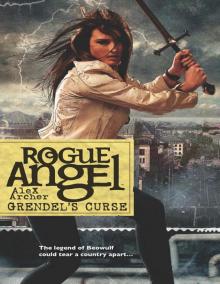 Grendel's Curse
Grendel's Curse The Matador's Crown
The Matador's Crown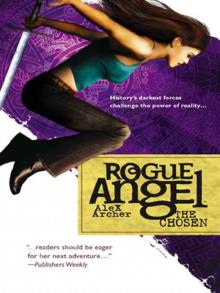 Rogue Angel: The Chosen
Rogue Angel: The Chosen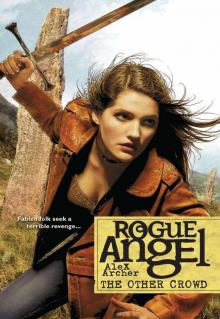 The Other Crowd
The Other Crowd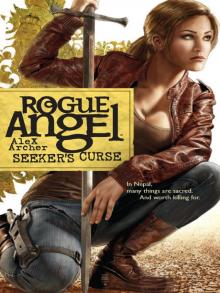 Seeker’s Curse
Seeker’s Curse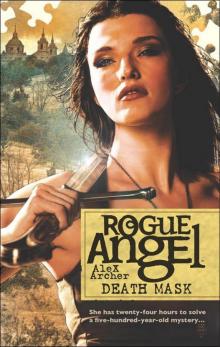 Rogue Angel 52: Death Mask
Rogue Angel 52: Death Mask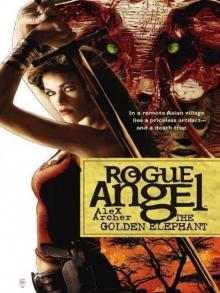 The Golden Elephant
The Golden Elephant Blood Cursed (Rogue Angel)
Blood Cursed (Rogue Angel) Celtic Fire (Rogue Angel)
Celtic Fire (Rogue Angel)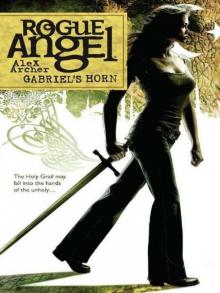 Gabriel's Horn
Gabriel's Horn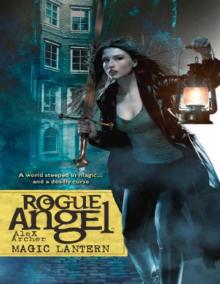 Magic Lantern (Rogue Angel)
Magic Lantern (Rogue Angel) God of Thunder
God of Thunder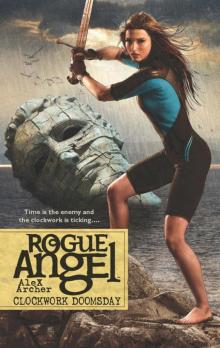 Clockwork Doomsday
Clockwork Doomsday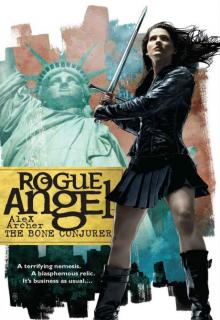 The Bone Conjurer
The Bone Conjurer Treasure of Lima
Treasure of Lima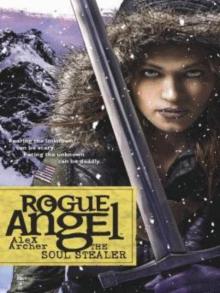 The Soul Stealer
The Soul Stealer The Dragon’s Mark
The Dragon’s Mark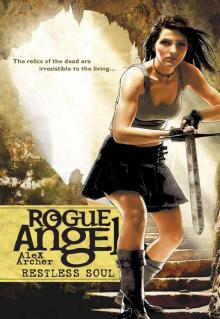 Restless Soul
Restless Soul Rogue Angel: God Of Thunder
Rogue Angel: God Of Thunder Rogue Angel 49: The Devil's Chord
Rogue Angel 49: The Devil's Chord Death Mask
Death Mask Rogue Angel 46: Treasure of Lima
Rogue Angel 46: Treasure of Lima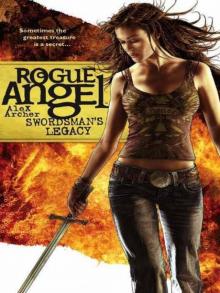 Swordsman's Legacy
Swordsman's Legacy The Oracle's Message
The Oracle's Message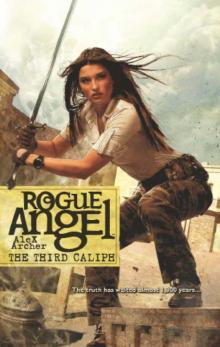 The Third Caliph
The Third Caliph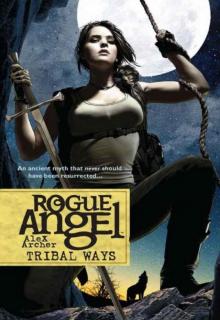 Tribal Ways
Tribal Ways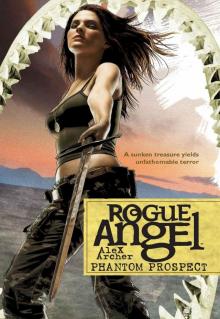 Phantom Prospect
Phantom Prospect Rogue Angel 50: Celtic Fire
Rogue Angel 50: Celtic Fire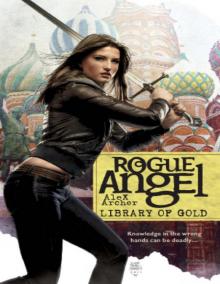 Library of Gold
Library of Gold Rogue Angel 53: Bathed in Blood
Rogue Angel 53: Bathed in Blood Sacred Ground
Sacred Ground The Devil's Chord
The Devil's Chord Serpent's Kiss
Serpent's Kiss The Vanishing Tribe
The Vanishing Tribe Sunken Pyramid
Sunken Pyramid Sunken Pyramid (Rogue Angel)
Sunken Pyramid (Rogue Angel)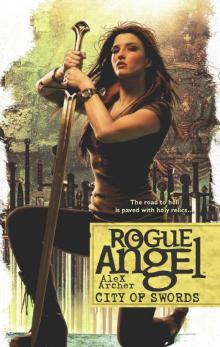 City of Swords
City of Swords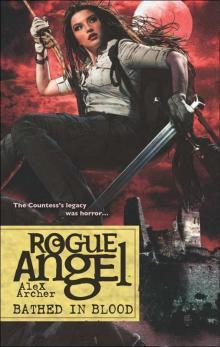 Bathed in Blood
Bathed in Blood The Lost Scrolls
The Lost Scrolls The Babel Codex
The Babel Codex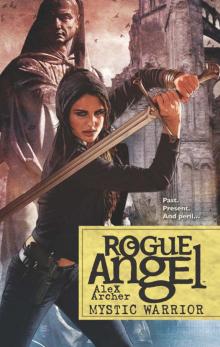 Mystic Warrior
Mystic Warrior Eternal Journey
Eternal Journey Beneath Still Waters
Beneath Still Waters Solomon's Jar
Solomon's Jar Beneath Still Waters (Rogue Angel Book 55)
Beneath Still Waters (Rogue Angel Book 55) Cradle of Solitude
Cradle of Solitude Secret of the Slaves
Secret of the Slaves River of Nightmares
River of Nightmares Polar Quest
Polar Quest False Horizon
False Horizon